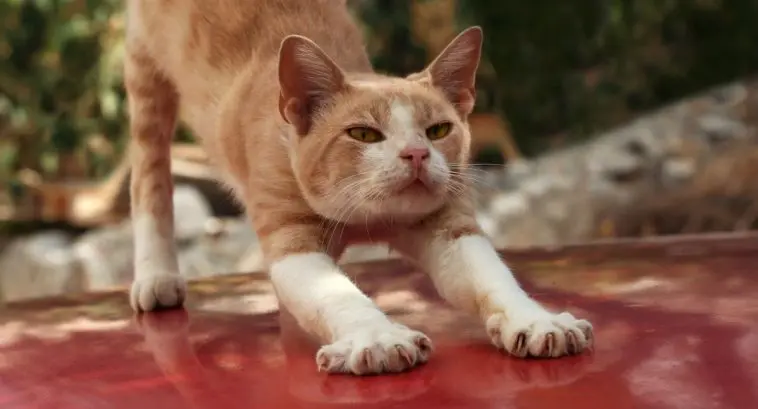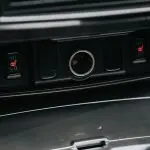For some reason, cats seem to love cars; Maybe it is the high perch or the heat of the engine. Cats have been seen sitting atop cars and sometimes under the hood as well.
The downside to this is, when their nails scratch the paint, exposing your vehicle to a host of problems, including rust damage.
What is the best way to keep cats off your car? There is not one but 11 ways to repel cats from coming near your car.
- Artificial Repellants
- Pet Alarms
- Cat repellents
- Static Mats
- MothBalls
- Motion Lights
- Sprinklers
- Smell Based Repellants
- Peppers
- Essential Oils
- Other techniques
- Train Your Cat
- Car Cover
- Block off Your Car
While cats love to scratch everything within their sight, you might also want to note that the cats do not intentionally harm your car.
They love high perches, and unfortunately, when they come down, their nails cause damage to the paint job. The best method of all is to condition your cat to not climb over cars.
Best Ways To Keep Your Cat Off Your Vehicle
Cats are kind of outdoor animals and when they find a high perch, they like nothing other than to bask in the warmth of the sun.
There is no way to avoid the scratch marks if they climb on the car. Not just that, it might not be the same every time, and you may even lose her/him.
A question I often get asked by pet owners, “how to keep cats off your car hood?”. I decided to put together my tried and tested methods on the subject.
Here are some ways by which you can condition your cat to leave the car alone.
1. Pet Alarms Scares The Cats
If you are a pet owner, you should have used or at least known about the pet alarm.
The product uses a loud shrill noise to discourage pets from climbing on the furniture where you have placed it. It is by far the most effective deterrent for cats.
It essentially uses a motion sensor or sometimes ultrasound system to detect the vibration caused by cats and then releases a shrill alarm.
You can buy them from general stores, pet stores, and online as well.
Another option is the ultrasonic pet alarm for the car which uses a motion sensor again to detect the pet’s movement.
When activated, it releases a burst of ultrasonic sound high enough that animals can only hear it.
Cats cannot tolerate the sound, and the cats move away from the location. Ultrasonic sounds are mostly inaudible to human ears.
They are small, easy to set up, and either solar operated or battery operated. Few also come with flashing strobe lights.
2. Cat Repellants Deters The Cats
Cat scratches on cars are a far bigger problem than you realize and obviously, there are products that you can use to deter cats from approaching your car.
One of those is the cat repellents which are available in the form of powder, oils, wax, and sprays.
But the key is finding the one that is repulsive to your cat. As with all beings with a sense of smell, cats do not tolerate certain odors, and I find that it differs from cat to cat.
A spray that works for one car may not work for the other. Make sure you do your research before choosing your product.
Also, the repellant that you buy should be safe for use on cats.
Ensure that you follow the instructions strictly; you do not want to make any other animals sick. The right product may be the solution that you seek.
Average cat repellant costs you about $20 and is well worth the money you spend.
3. Shock The Cats Away With Static Mats
Just skip this option if the idea of making your cat uncomfortable disturbs you; Again, uneasy, and not hurt it.
Static mats are not only ideal for your car, but also for any surfaces that you do not want your cat to climb on. It delivers a small static charge when it detects a paw on the mat.
While it doesn’t harm your cat in any way, it gives it an uncomfortable tingling that it thinks twice before venturing to the area again.
All you need is a week or two with the static mat before the cat stops climbing up your car. Cats usually climb on the vehicle, via the hood; hence, it may be the best place to place it.
The mat is the highest-priced of all the options nearing $50 but also is the most effective too. It can be used to deter cats and other animals from straying into areas where they are not supposed to.
However, they are not waterproof and you can only use them if the car is parked in a garage.
4. Mothballs Can Also Work For Cats
Mothballs are those little balls that you keep in the closet to protect your clothes from moth. Did you know that they can repel cats?
The reason is the pungent smell they release as they dissolve in the air. While humans cannot sense them, cats with their delicate sense of smell dislike them.
I’d suggest you tie a few mothballs in a netted bag and place it on the hood. Another option is to put the balls in a circle around the car. They do not cost you much and can work like magic in a pinch.
But finally a warning, these are toxic to the little felines. So, you may want to think twice before turning to mothballs as a solution.
5. Scatter Feral Cats With Motion Lights
Most houses these days are equipped with motion sensor lights. These can act as a deterrent for feral cats as well.
They roam around at night when there are not many people out and are skittish in nature. Hence the slightest noise or movement or even light can scare them.
Install a light powered by a motion sensor; when the light comes on suddenly, they are sure to scamper leaving the car alone. Make sure to leave the lights pointing at your car.
While they do not cost much, it may not be of much use for house cats or during the day time.
6. Douse Them With Sprinklers
If you are a pet owner, you must know that cats hate water. And that’s why it is used to train cats and to refrain from doing something or wandering to certain areas.
However, this may not work if you have to run to the car every time a cat ventures near it.
An automatic lawn sprinkler fitted with a motion sensor can work as a deterrent for feral or neighborhood cats that wanders to your car.
Invest in one and have it fitted facing the car; Any movement and your sprinkler would go off dousing the cat. Since cats do not like water, they might not come back again.
7. Turn On The Heat With Peppers
Peppers are a great option if you are looking for a safe and budget-friendly option.
Cats do not care much for the taste of peppers. They do not like the tingling sensation a pepper gives when ingested, making it an ideal repellant.
Sprinkle a little here and there on the hood of your car and also make sure to sprinkle around your car as well. In most cases, the cats would turn away due to the smell of peppers.
But, if not they would get the peppers on their paws, and when they clean them later on, they are sure to hate it.
This may not work the first instance but give it time, and they will scoot free of your car. You can use both Cayenne Pepper and Black Pepper to enter the cats.
8. Your Cats May Not Love Essential Oils As Much As You Do
As I mentioned earlier, cats are very sensitive to smell and hate certain scents that they would not go anywhere near it. You can use it to your advantage and get your cats to leave the car alone.
But not all cats are the same, and you’d have to use the trial and error method to find out which one repels him/her the most.
You can use one of the below essential oils to make a spray to use on your vehicle.
- Citrus
- Orange
- Lavender
- Peppermint
For your spray, mix one part of the oil with three parts of water; Spray around the car and on the window as well. You can also soak cotton balls in the solution and place them around the vehicle.
Douse six pieces of paper with the same solution as above; place two of them on the windshield held by the wipers.
Hang the rest of them on the windows. Open the windows, place them on top and close, so that they hold together by themselves.
9. Train Your Cat Using Traditional Methods
While the above methods train/scare the cats to leave your car alone, you might want to resort to traditional training methods if you could spare the time.
This is also an ideal option if any or all of the above options have you rankled.
This is a time-consuming method and works when kept at it relentlessly. Many pet owners prefer this to the above since this lets the cats understand the actions and consequences.
Positive reinforcements and timeouts are part of traditional training methods.
10. Car Cover
If you have a pampered pet at home and nothing you have tried so far is working, get a car cover.
This may cause inconvenience since you have to remove it every morning and put it on again at night. It is the price you pay to keep the car safe from its sharp talons.
Car hood cover for cats is not costly but surely more expensive than pepper or mothballs. It is also a diplomatic way to let your cat have its way while protecting your car.
Few cats hate the feel of car covers and may finally leave your car alone. You can also spray the DIY essential oil solution I mentioned earlier to your car cover instead of on your car.
11. Block Off Your Car
Finally, in conjunction with any of the above options, you should block off your car from your pets.
In case you are using a garage, make it a cat-free zone and make sure it doesn’t go inside it at any time of the day.
If using the front yard, make sure the cat stays inside or in the backyard. It has no business being in the front yard anyway. It can wander away and may be vulnerable to the vehicles on the roads.
While this may work for your pet, stray or feral cats can always climb on your cats. Hence as I said earlier, use any of our options mentioned above along with blocking your car to see fast results.
FAQs
Q1. How Do I Keep My Cat From Getting Under The Hood Of My Car?
Cats can seek the warmth of the engine during cold weather.
While you cannot block the access, you can place a repellent to prevent the cat from returning. As cats are sensitive to smell, a repellent like sulfur placed in an aluminum can work the best.
Ensure that it is secured to a non-moving part to prevent damage to your car.
Q2. How Do I Get A Cat Out Of My Car?
A hard bang on the hood of the car or a honk of your horn should get them scrambling. If not, open the hood and try to shoo the cat away.
If nothing works, the cat is either sick or too young to move. Wear thick gloves and try moving them to a safer location.
If nothing works, local shelters can help you move the little ones.
Q3. What Smells Do Cats Hate The Most?
If you are a pet owner, you may have found that cats hate many smells and are very particular about it. It varies depending on the cat, but a generic list is as follows:
- Citrus smells
- Lavender
- Eucalyptus
- Rosemary
- Thyme
- Rue
- Mint
- Evergreen
- Cinnamon
- Menthol
- Pine
- Cedar
- Banana
- Mustard
Conclusion
At the end of the day, it is in the best interest of the cat as well as your car that it stays away.
There are quite a lot of repellents and contraptions designed to scare your pet and strays away from the vehicle.
If you are looking to go natural, you do have options here too including peppers, essential oils, etc.
The above works for your pet and also for stray cats too. Cat scratches do not look like a big issue right now, but down the road, you might have to deal with rust related damages.
Hence, it is crucial that you make sure that your car is a car-free zone.




